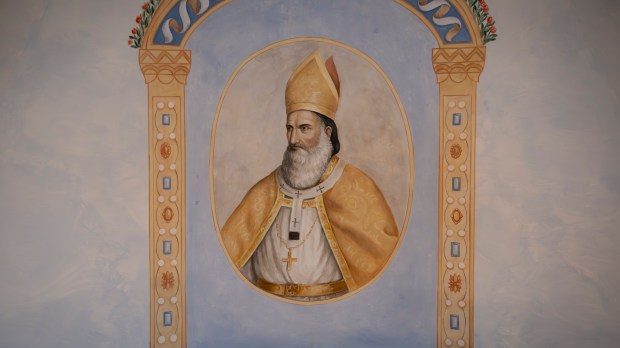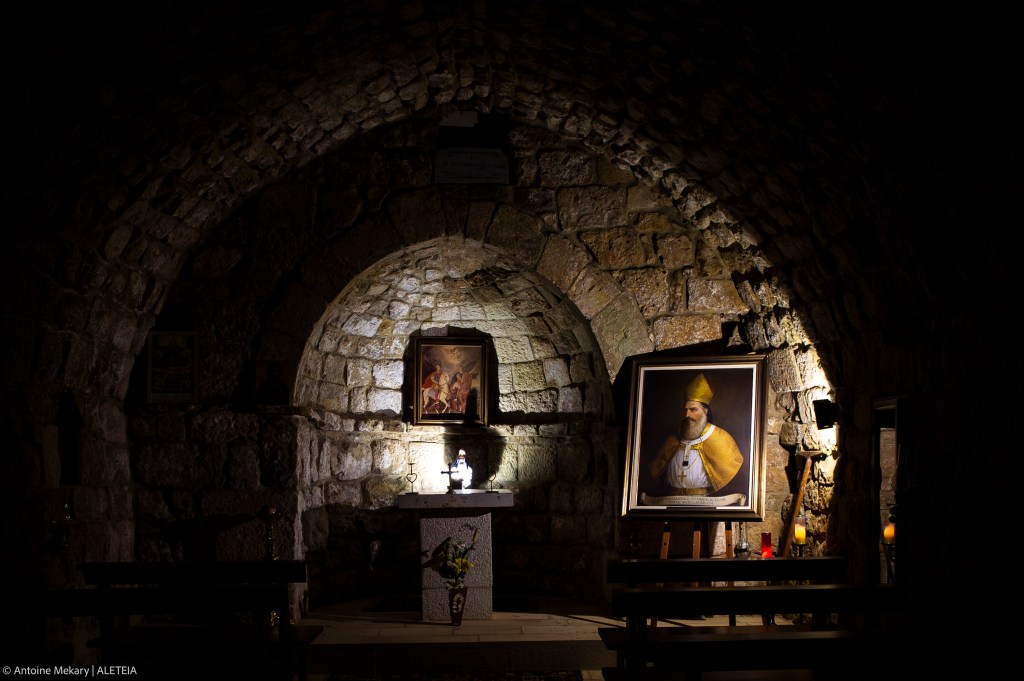While Lebanon is in the headlines this week, an important event there will take place this August 2, 2024, and it has nothing to do with regional war. Estephan El Douaihy will be beatified.
Known in Latin as “STEPHANUS ALDOENSIS,” Estephan El Douaihy was the 57th Patriarch of Antioch and the East for the Maronites from 1670 until 1704. Renowned as a prominent Lebanese historian and theologian, he earned titles such as “The Father of Maronite History” and “The Second Chrysostom.”
Estephan Douaihy, born on August 2, 1630, in Ehden, in north Lebanon, was the son of the Sub-Deacon Mikhael and Maryam (Mary) Douaihy. He lost his father at the age of three. At 11, he was sent by Patriarch Jirjis Amira to the Maronite College in Rome, where he studied for 14 years, mastering rhetoric, logic, mathematics, philosophy, theology, and multiple languages, including Arabic, Syriac, Italian, Latin, and Greek.
He refused to remain in Rome and wanted to return to his hometown to serve his people. He was ordained a priest in Ehden on March 25, 1656, by Patriarch Yuhanna Safrawi. After being ordained, he served in Aleppo and the Lebanese countryside before being elected bishop of the Maronite Eparchy of Cyprus in 1668.
In 1670, he became Patriarch, implementing significant reforms to preserve and develop Maronite liturgy with a focus on Syriac traditions and reducing Latin influences.
Despite facing persecution, Douaihy continued his scholarly work, often writing in hidden caves. He passed away on May 3, 1704, in Qannubine, Kadisha Valley.
Regarded as a saint by many Maronites directly after his death, many wrote about his life and miracles, including patriarchs and bishops. His heroic virtues were recognized by Pope Benedict XVI on July 3, 2008. Pope Francis approved a miracle attributed to him on March 17, 2024, and he is set to be beatified on August 2, 2024.
With this brief biography, Father Antonio Douaihy introduces the new Blessed. Father Anthony is a priest from the Maronite Patriarchal Eparchy, Vicariate of Ehden–Zgharta, in north Lebanon. He is pursuing higher studies in the faculty of Eastern Ecclesiastical Sciences-Sacred Liturgy, at the Pontifical Gregorian University, Pontifical Oriental Institute in Rome, Italy.
Aleteia asked him to tell us more about this patriarch of his homeland, known for promoting Church unity, and a model of the faith-science alliance.

Aleteia: Why is it said that Estephan Douaihy is a beacon of knowledge and holiness?
Fr. Antonio: Estephan Douaihy is revered as a beacon of knowledge and holiness due to his profound dedication to both intellectual pursuit and spiritual leadership. He seamlessly integrated his extensive theological education and philosophical debates with his commitment to serving God and his people. Douaihy completed his theological studies, earning a doctorate in theology. His philosophical and theological debates resonated significantly in Roman circles. Despite encouragement from members of the Sacred Congregation, Jesuit fathers, and Roman nobility to remain in the West as a professor, Douaihy insisted on returning to his homeland to serve his people and Church with his acquired knowledge.
His dedication to serving the flock of the Lord was evident in his actions as a priest, bishop, and patriarch. As a priest, he immediately began teaching children and writing books, strengthening the faith of many through his homilies. As a bishop, he was a guiding presence for his people, and as a patriarch, he became a foundational figure, embodying the following proclamation:
“The Maronite Church owes its foundation to its hermit father, St. Maron, its unification in Lebanon to its first patriarch, St. John Maron, and its resilience and organization to the blessed Patriarch Estephan Douaihy of Ehden.”
Living a life of humility and prayer, Douaihy was a paragon of faith, using all of God’s gifts and his talents for the benefit of his Church. He meticulously collected and studied manuscripts, creating comprehensive lists and authoring many manuscripts with the help of several copyists. His contributions to the liturgical sphere are numerous, including works like “The Lamp of the Sanctuary,” the “Book of Anaphors,” the Book of ‘Šartouniya — pontificals, funeral rites, prayers of the hours, and vows for new monks. He also composed a wide array of books on sacred music and philosophy and wrote several polemical texts defending the orthodoxy of the Maronite faith and its unity with Rome.
Notably, Douaihy authored many historical books documenting periods in the East, including those of Muslims, which no other historian had previously chronicled, earning him the title of a great historian. Through his scholarly works and unwavering commitment to his faith and people, Estephan Douaihy remains a shining example of how knowledge and holiness can together serve the greater good of the Church and society.
Aleteia: Why do you think this holy man should be known outside of Lebanon, and around the world?
Fr. Antonio: Blessed Estephan Douaihy’s significance extends far beyond the Maronite Church, encompassing all Eastern Churches that today have spread across the globe. His scholarly contributions and writings, particularly his use of Western languages acquired during his time in Rome, played a pivotal role in making Eastern heritage known and respected in the broader Christian world. His theological and historical works are priceless, but what truly stands out is his profound love for the Church, his commitment to its unity, and his unwavering Catholic faith.
Douaihy exemplified how deep love for the Church can inspire a person to dedicate all their talents to strengthening faith and preserving sacred tradition. His life and work demonstrate a model of devotion, resilience, and intellectual rigor that can inspire believers worldwide. His story serves as a testament to the power of faith and the importance of preserving and celebrating religious heritage, making him a figure worthy of global recognition and admiration.
His life and work demonstrate a model of devotion, resilience, and intellectual rigor that can inspire believers worldwide
Aleteia: With the region suffering so much right now, what does Blessed Estephan say to his homeland?
Fr. Antonio: In a time when the region is enduring immense suffering, the words and actions of Blessed Estephan Douaihy offer a profound message to his homeland. As a patriarch during a delicate period of persecution, he experienced the pain of being forced to flee repeatedly, and even endured disrespect and physical assault. Despite these hardships, he stood as a beacon of resilience and faith, embodying the endurance and suffering of Christ.
Blessed Estephan Douaihy confronted persecution head-on, never abandoning his land or his people. He was a steadfast defender against oppression and injustice. His life encourages us to stand firm and strong in the face of adversity, to protect the vulnerable, and to live out the calling of Jesus to be “the salt of the earth and the light of the world.” In our current struggles, we can draw inspiration from his unwavering commitment and courage, finding strength to persevere and uphold justice.
Aleteia: What is your favorite quote or anecdote from his life?
Fr. Antonio: One of my favorite quotes from the life of Blessed Estephan Douaihy is: “If after my death, my bones will serve the Church in anything, take them away from my grave and use them.” This quote epitomizes his selfless dedication to God and the Church. Estephan Douaihy, who left his home as a child and devoted his entire life to serving the Church, was willing to offer even his bones for its benefit after his death.
Remarkably, after his beatification, his bones have indeed become significant, serving as relics that are venerated in the Church.
Aleteia: Could you point to one virtue in particular that characterizes him?
Fr. Antonio: One virtue that particularly characterizes Patriarch Estephan Douaihy is his profound embodiment of his priestly vocation. He exemplified the threefold identification with Christ as Priest (sanctifier), Prophet (teacher), and King (governor). Throughout his life, whether as a priest, bishop, or patriarch, Douaihy demonstrated how one could effectively teach, sanctify, and govern for the betterment of the Church and the people of God. His unwavering commitment to these roles showcases his dedication to the greatness of the Church and the spiritual well-being of his community, making him a model of priestly virtue.





